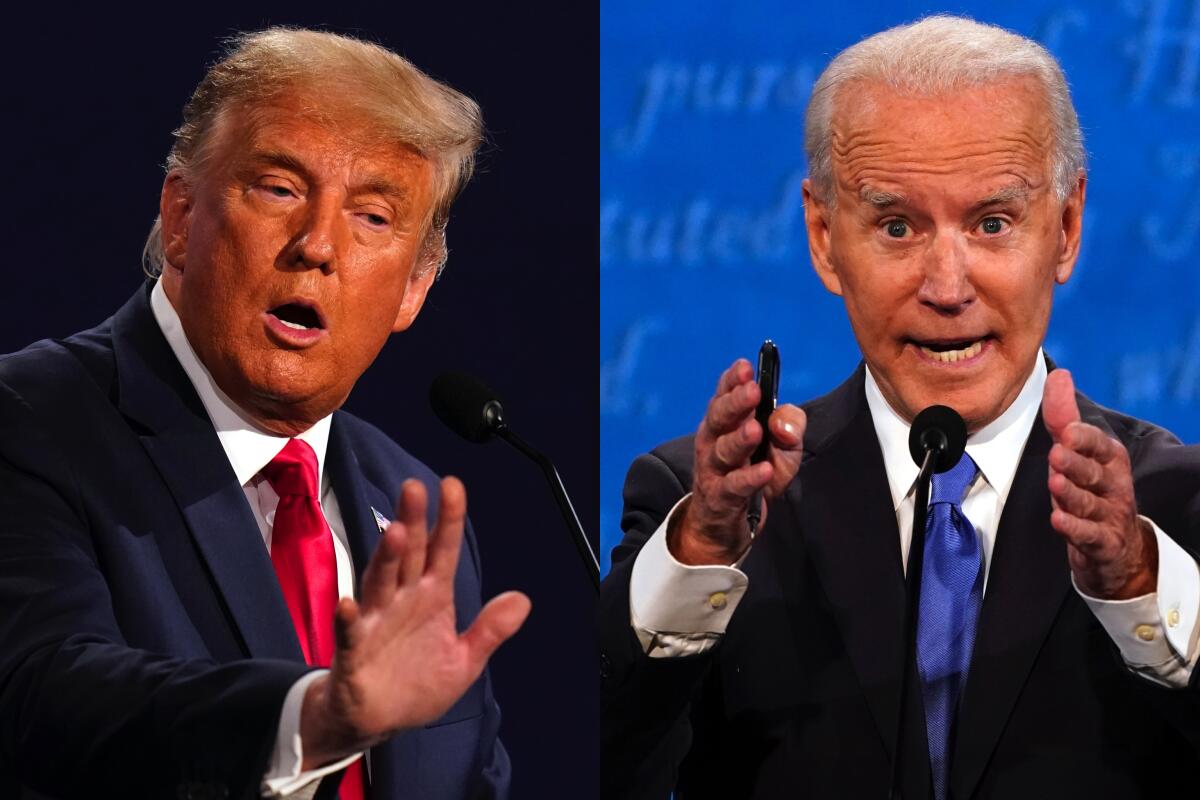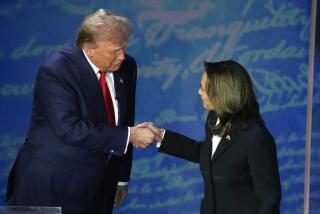Editorial: Trump was less unhinged in the second debate, but Biden still scored

More than 47 million Americans already have voted, and it’s doubtful that many who still haven’t cast a ballot are undecided about whom to choose for president. In Thursday’s second and final presidential debate, President Trump said nothing to persuade those who haven’t made up their minds that he deserves a second term. Democratic nominee Joe Biden, on the other hand, demonstrated a command of the issues and a seriousness of purpose that ought to reassure any voters who still are struggling with their choice.
The challenge for Trump going into the event was to repair the damage he has inflicted on his campaign since the first debate Sept. 29, when his unhinged interruptions made a mockery of the idea of an exchange of views.
Since then, Trump has continued to minimize the seriousness of the COVID-19 pandemic — despite his own infection — while calling Dr. Anthony Fauci a “disaster.” He has publicly agitated for his attorney general to undertake — or at least announce — an investigation of Biden and his son Hunter before the election, a domestic reprise of the corrupt attempt to shake down Ukraine’s president in 2019 that led to his impeachment.
But when Thursday’s debate began, it was obvious that Trump had listened, however grudgingly, to advisors who warned him against a repeat of the disastrous first matchup. The president was considerably more subdued and disciplined than he was in the first go-around. Still, he served up a farrago of lies, cheap shots and absurd claims, such as his flabbergasting assertion that he has done more for African Americans than any president since Abraham Lincoln.
And though he was comparatively civil for most of the encounter, at times he reverted to his insult-comic persona. Nor could he resist the temptation to trot out hobbyhorses such as the supposed influence on Biden of Rep. Alexandria Ocasio-Cortez (D-New York) and other left-wing members of Congress. The message to viewers was that Trump cared most about the least consequential things.
Biden’s challenge was different: With his lead tightening, the former vice president had to reassure voters that he wasn’t the figure Trump has said he is: an advocate of socialized medicine, a pawn of the radical left, a corrupt politician who benefited financially from public office.
Biden met that challenge, despite occasional missteps and the insertion into his answers of prefabricated talking points. (Some of these struck home, such as his comment to viewers that, instead of talking about the Trump and Biden families, “we should be talking about your family.”)
Biden effectively parried Trump’s charge that he would usher in socialized medicine by pointing to the fact that he defeated candidates in the Democratic primaries who advocated Medicare for all. He adroitly explained that Trump seeks the invalidation of the Affordable Care Act and hasn’t offered a plan to safeguard people with preexisting conditions.
Finally, as he did in the first debate, he made a compelling case against Trump’s mishandling of the coronavirus crisis, and he effectively faulted the president for not working with Congress to enact an additional coronavirus stimulus bill. Trump persisted in an essentially Pollyannish view of the course of the virus, promising that a vaccine is ready and would be delivered soon.
Biden dealt effectively with Trump’s claim that he and his family had profited from his service as vice president, even if he could have been clearer that his son Hunter created an appearance problem with his business activities, saying, “I have not taken a penny from any foreign source ever in my life.” He noted that administration officials who testified during the impeachment proceedings said they found no fault with his conduct related to Ukraine.
Biden benefited from the fact that Trump’s claims of corruption were arcane and hard to follow. The president’s reference to the “laptop from hell” — a computer supposedly deposited with a Delaware repair shop by Hunter Biden — no doubt resonated with consumers of right-wing media, but most voters were probably left scratching their heads.
Before the debate, the sliver of voters who were still undecided had to choose between an epically incompetent and corrupt incumbent and a seasoned and serious politician who listens to experts and doesn’t see the presidency as a reality TV show. Thursday’s debate was a more conventional, less bizarre encounter than the first one, but it didn’t change the nature of that choice.
More to Read
A cure for the common opinion
Get thought-provoking perspectives with our weekly newsletter.
You may occasionally receive promotional content from the Los Angeles Times.










